
Marcel Marceau was a French mime artist and actor most famous for his stage persona, "Bip the Clown". He referred to mime as the "art of silence", performing professionally worldwide for more than 60 years.

Agnès Varda was a Belgian-born French film director, screenwriter and photographer.
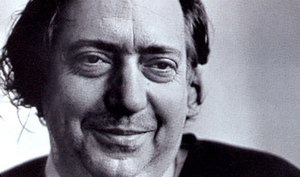
Henri Langlois was a French film archivist and cinephile. A pioneer of film preservation, Langlois was an influential figure in the history of cinema. His film screenings in Paris in the 1950s are often credited with providing the ideas that led to the development of the auteur theory.
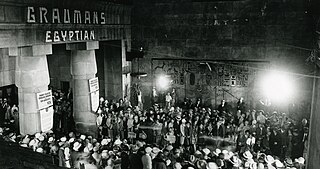
Grauman's Egyptian Theatre, also known as Egyptian Hollywood and the Egyptian, is a historic movie theater located on Hollywood Boulevard in Hollywood, Los Angeles, California. Opened in 1922, it is an early example of a lavish movie palace and is noted as having been the site of the world's first film premiere.
Kasi Lemmons is an American film director, screenwriter, and actress. She made her directorial debut with Eve's Bayou (1997), followed by Talk to Me (2007), Black Nativity (2013), Harriet (2019), and Whitney Houston: I Wanna Dance with Somebody (2022). She also directed the Netflix limited series Self Made (2020), and an episode of ABC's Women of the Movement (2022).
James B. Harris is an American film screenwriter, producer and director. Born in New York City, he attended the Juilliard School before entering the film industry. He worked with film director Stanley Kubrick as a producer on The Killing (1956), Paths of Glory (1957), and Lolita (1962). Harris' directorial debut was the Cold War thriller The Bedford Incident (1965). He also directed the actor James Woods in two films: the prison-guard drama Fast-Walking (1982) with actress Kay Lenz, and the thriller Cop (1988), based on a James Ellroy novel, which Woods co-produced. Harris also directed the 1993 thriller Boiling Point.

Ellen Rose Albertini Dow was an American film and television character actress and drama coach. She portrayed feisty old ladies and is best known as the rapping grandmother Rosie in The Wedding Singer (1998), performing "Rapper's Delight". Dow's other film roles include elderly lady Mary Cleary who "outs" her grandson in Wedding Crashers, Disco Dottie in 54, the recipient of Christopher Lloyd's character's slapstick in Radioland Murders and a choir nun in Sister Act. She was best known to small screen audiences for her guest appearances on sitcoms The Golden Girls and Will & Grace.

Tala Hadid is a film director and producer. She is also a photographer. Her work has been shown at the Museum of Modern Art in New York City, The Walker Arts Center in Minneapolis, The Smithsonian National Museum, The National Museum of Women in the Arts in Washington D.C., L'Institut du Monde Arabe in Paris and other locations.
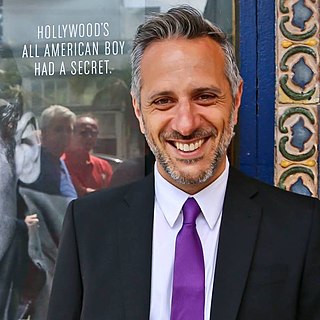
Jeffrey Schwarz is an American Emmy Award-winning film producer, director, and editor. He is known for an extensive body of documentary work including Commitment to Life, Boulevard! A Hollywood Story, The Fabulous Allan Carr, Tab Hunter Confidential, I Am Divine, Vito, Wrangler: Anatomy of an Icon and Spine Tingler! The William Castle Story.
Nils Malmros, a Danish film director and screenwriter, is considered a leading auteur of realism in Danish cinema. Malmros is noted for his detailed focus on the common growing pains of adolescence and the loss of innocence, which he draws from his childhood experiences growing up in Århus, Denmark. His most notable films form a trilogy about schoolchildren in 1950s Århus: Lars-Ole 5c, Boys and Tree of Knowledge. The latter film, 1981's Tree of Knowledge, is one of ten films listed in Denmark's cultural canon by the Danish Ministry of Culture.
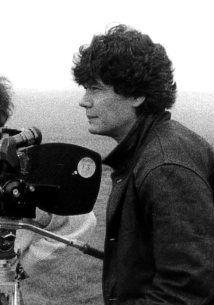
DamianPettigrew (1963) is a Canadian filmmaker, screenwriter, producer, author, and multimedia artist, best known for his cinematic portraits of Balthus, Carolyn Carlson, Federico Fellini, and Jean Giraud.
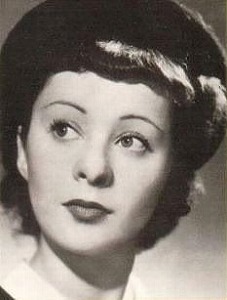
Sylvia Bataille was a French actress of Romanian-Jewish descent. When she was twenty, she married the writer Georges Bataille with whom she had a daughter, the psychoanalyst Laurence Bataille (1930–1986). Georges Bataille and Sylvia separated in 1934 but did not divorce until 1946. Starting in 1938, she was a companion of the psychoanalyst Jacques Lacan with whom, in 1941, she had a daughter, Judith. Sylvia Bataille married Jacques Lacan in 1953.
Alice O'Fredericks was a Danish actress, screenwriter, and film director. She is best known for directing the series of Far til Fire comedies and the series of family dramas based on Morten Korch novels. Having written 38 produced screenplays and directed 72 feature films, O'Fredericks was one of the most prolific directors in Danish cinema. O'Fredericks also directed the first Danish films which highlighted women's rights. The Alice Award, presented annually to the Best Female Director at the Copenhagen International Film Festival, is named in her honor.
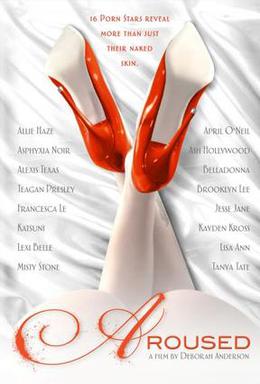
Aroused is a 2013 feature-length documentary film directed by the photographer Deborah Anderson, in her directorial debut. It focuses on the lives and careers of 16 pornographic actresses. The film's structure includes interviews with the women both during makeup and during a subsequent photo shoot for Anderson's coffee table book of the same name as the documentary. Quotes are presented in title cards throughout the film on the topic from women including Erica Jong, Marlene Dietrich, and Gloria Leonard. The actresses interviewed describe their early upbringing, entry into sexual activity, and motivations for entering the adult film industry. A female talent agent within the industry, Fran Amidor, provides a counterpoint to the interviews. Several of the actresses recount facing stigma and discrimination due to their career choice. Katsuni reflects on the impact of entering the industry, and criticizes society's "judgment of morality".

Jean Douchet was a French film director, historian, film critic and teacher who began his career in the early 1950s at Gazette du Cinéma and Cahiers du cinéma with members of the future French New Wave.
The World of Alfred Hitchcock is a 1976 Danish television documentary about the English film director Alfred Hitchcock directed by Annett Wolf. Shot after the completion of Family Plot, it was part of a series of films she made in Hollywood during the one-year leave of absence she took from DR (broadcaster)
Jack Lemmon – A Twist of Lemmon is a 1976 Danish documentary television film directed by Annett Wolf, about the American actor Jack Lemmon. The film won the 1976 Billedbladets Gyldne Rose. It was the first film directed by Annett Wolf in Hollywood.

It Happened at the Inn is a 1943 French mystery film directed by Jacques Becker and starring Fernand Ledoux, Robert Le Vigan, Georges Rollin and Blanchette Brunoy. It follows an investigation into the family members of an old woman who has been murdered. The film is based on the 1937 novel with the same title by Pierre Véry. It was released in France on 14 April 1943.

Marquise Lepage, is a Canadian (Québécoise) producer, screenwriter, and film and television director. She is best known for her 1987 feature Marie in the City , for which she received a nomination for Best Director at the 9th Genie Awards in 1988. She was also a nominee for Best Live Action Short Drama at the 14th Genie Awards in 1993 for Your Country, My Country . She was hired by the National Film Board (NFB) as a filmmaker in 1991. One of her first major projects for the NFB was The Lost Garden: The Life and Cinema of Alice Guy-Blaché, a documentary about female cinema pioneer Alice Guy-Blaché.
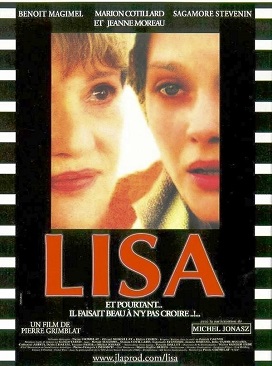
Lisa is a 2001 French-Swiss romantic drama war film directed by Pierre Grimblat based on the novel Théâtre dans la nuit by Patrick Cauvin, starring Jeanne Moreau, Marion Cotillard, Benoît Magimel and Sagamore Stévenin. It was released theatrically in France by Capitol Films on 10 January 2001.













